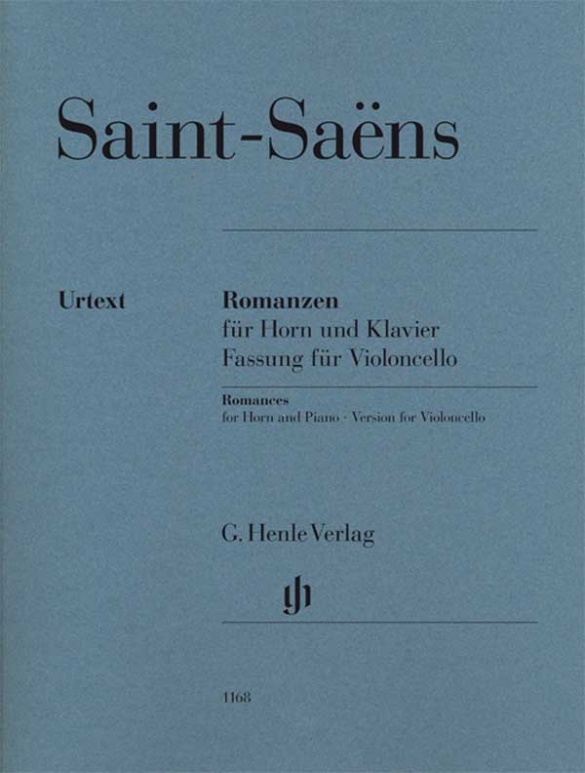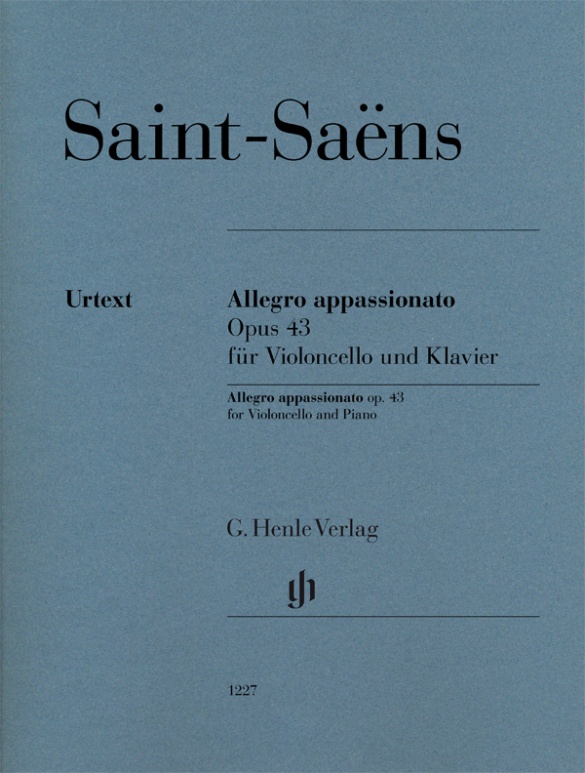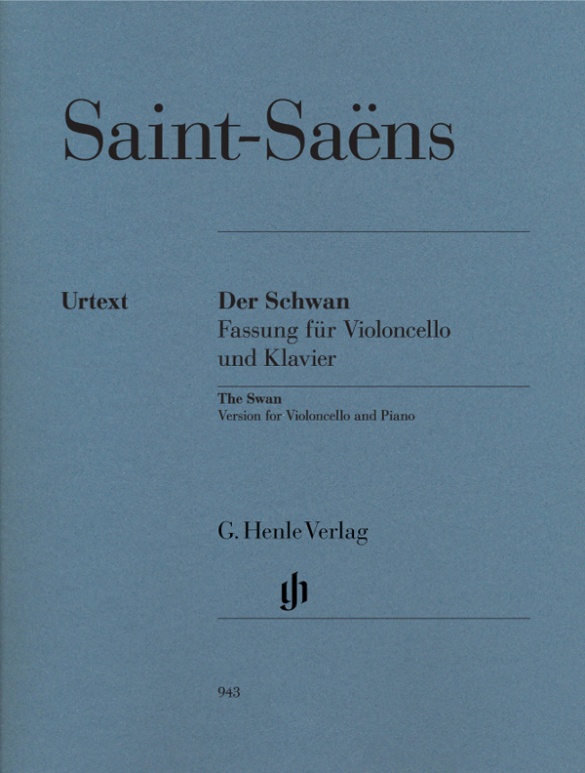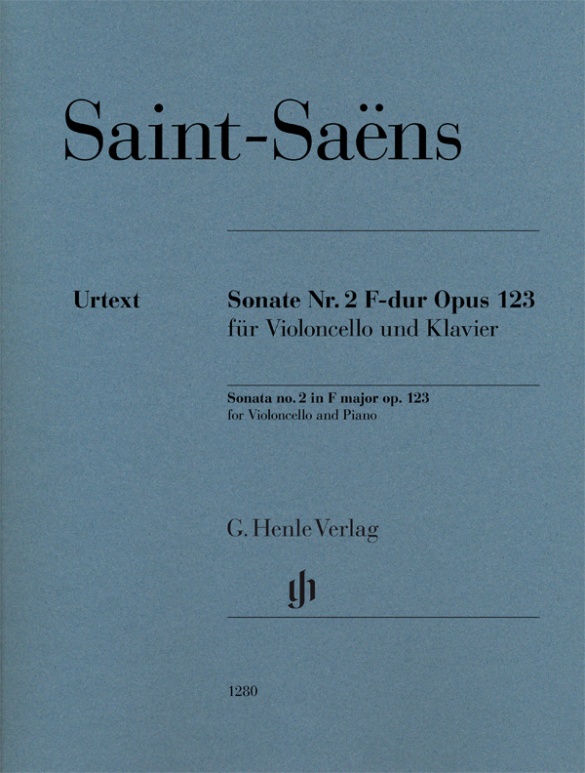

Camille Saint-Saëns
Violoncello Sonata no. 2 F major op. 123
After his first cello sonata of 1872 (HN 1057) had fast gained popularity, the publisher kept asking the composer to write a second sonata for this scoring. But it was only in March 1905, in the mild climate of Algeria, that Saint-Saëns finally relented and composed a large sonata with four movements. He personally thought it superior to the first sonata and even believed that its third movement, the “Romanza”, was an equivalent to the famous “Swan” in the “Carnival of the Animals” (HN 943). However, this work is still overshadowed by the first sonata, not least because the second places greater technical and artistic demands on cellists. Our Henle Urtext edition, the first text-critical edition of the work ever, now offers cellists a chance to rediscover this composition.
Content/Details
About the Composer
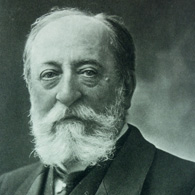
Camille Saint-Saëns
Saint-Saëns was one of the most multifaceted musicians of the second half of the nineteenth century in France. Regarded as a Classicist, he also wrote pieces with an Impressionist character to their sound, and one composition in quarter-tones. As a critic and essayist he was involved in the first complete editions of Rameau’s and Gluck’s works.
| 1835 | Born in Paris on October 9. Early comprehensive education. |
| 1848–52 | Studies at the Conservatoire de Paris. |
| 1853 | Organist at St. Merry Church in Paris. |
| 1853–59 | First large-scale works: Symphony No. 1, Op. 2 (1853), and No. 2, Op. 55 (1859); Piano Concerto No. 1, Op. 17 (1858); Violin Concerto No. 1, Op. 20 (1859); Mass, Op. 4 (1856); he attempts to arrive at unique forms. |
| 1857–77 | Organist at La Madeleine in Paris. |
| 1861–65 | He teaches at the École de Musique Classique et Religieuse Niedermeyer. |
| 1871 | Founding of the Société Nationale de musique. |
| 1871–77 | Composition of symphonic poems “Le rouet d’Omphale” (“The Wheel of Omphale,” 1871), “Phaéton” (1873), “Danse macabre” (1874), “La jeunesse d’Hercule” (1877). |
| 1876 | Attends the performance of the Ring in Bayreuth. |
| 1877 | Performance in Weimar of his opera “Samson et Dalila.” |
| 1881 | Member of the Académie des Beaux-Arts. |
| 1883 | Performance in Paris of his opera “Henry VIII.” |
| 1885 | Publication of the treatise “Harmonie et mélodie.” |
| 1886 | Performance in London of his Organ Symphony (Symphony No. 3 in C minor): major work with thematic transformation after Liszt’s model. Composition of “The Carnival of the Animals,” the publication of which he forbade during his lifetime. |
| 1899 | Publication of the book “Portraits et souvenirs.” |
| 1900 | Cantata “Le feu celeste” in praise of electricity, for the opening of the Exposition Universelle. |
| 1921 | Death in Algiers on December 16. |
About the Authors

Peter Jost (Editor)
Dr. Peter Jost, born in 1960 in Diefflen/Saar, read musicology, German and comparative studies at Saarland University in Saarbrücken. He did his PhD in 1988 with a thesis on Robert Schumann’s Waldszenen.
From November 1991 to April 2009 he was a research associate at the Richard Wagner Complete Edition in Munich, and since May 2009 has been an editor at G. Henle Publishers. His Urtext editions comprise predominantly French music of the 19th and 20th centuries, including works by Lalo, Saint-Saëns and Ravel.
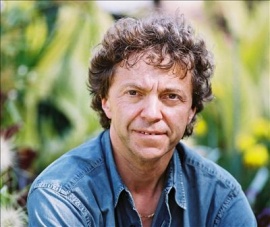
Pascal Rogé (Fingering)
David Geringas (Fingering and bowing for Violoncello)
Product Safety Informations (GPSR)

G. Henle Verlag
Here you can find the information about the manufacturer of the product.G. Henle Verlag e.K.
Forstenrieder Allee 122
81476 München
Germany
info@henle.de
www.henle.com
Der "Schatz", von dem hier berichtet werden soll, entstand vor kaum mehr als hundert Jahren. Gemeint ist Camille Saint-Saëns` 2. Cellosonate aus dem Jahr 1905, ein ambitioniertes, umfangreiches Werk, dem eine nachhaltige Erweckung aus seinem gegenwärtigen Dornröschenschlaf zu wünschen ist. Vielleicht trägt die hier vorgelegte Publikation des Urtextes dazu bei, dass Cellisten und Pianisten einmal beherzt zugreifen und dafür die vertrauten Standardwerke (sie laufen ja nicht weg!) für kurze Zeit im Notenregal stehen lassen.
Das Orchester, 2017This fine urtext edition, primarily based on the first edition, includes historical notes and critical comments. (...) Layout is excellent for ease of reading and page tuning.
AUSTA Stringendo, 2017recommendations
autogenerated_cross_selling
Further editions of this title
Further editions of this title


